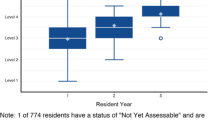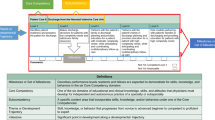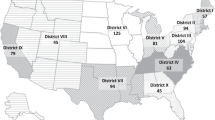Abstract
Objective:
Ensuring that neonatal–perinatal medicine (NPM) fellows attain competency in performing neonatal procedures is a requirement of training-competent neonatologists.
Study Design:
A survey of NPM fellows was performed to determine the procedural experience of current fellows, investigate techniques used to track procedural experience and examine the methods programs use to verify procedural competency.
Results:
One hundred and sixty-three fellows in 57 accredited training programs responded to the survey. Reported number of procedures provide contemporary normative data on procedural experience during training. The majority of fellows reported using an online reporting system to track experience. The most common technique to verify procedural competency was supervised practice until an arbitrary number of procedures had been performed.
Conclusions:
NPM fellow procedural experience increases significantly for most, but not all, procedures duration training. We speculate that supplemental simulation training for rare neonatal procedures would help ensure the competency of graduating NPM fellows. Experience alone is insufficient to verify competency. Further work on the accurate tracking of experience and verification of procedural competency is needed.
This is a preview of subscription content, access via your institution
Access options
Subscribe to this journal
Receive 12 print issues and online access
$259.00 per year
only $21.58 per issue
Buy this article
- Purchase on Springer Link
- Instant access to full article PDF
Prices may be subject to local taxes which are calculated during checkout

Similar content being viewed by others
References
ACGME Program Requirements for Graduate Medical Education in Neonatal–Perinatal Medicine. Effective: 1 July 2013. Available at https://www.acgme.org/acgmeweb/portals/0/pfassets/2013-pr-faq-pif/329_neonatal_perinatal_peds_07012013.pdf (last accessed 17 June 2015).
Frank JR, Snell LS, Cate OT, Holmboe ES, Carraccio C, Swing SR et al. Competency-based medical education: theory to practice. Med Teach 2010; 32 (8): 638–645.
Falck AJ, Escobedo MB, Baillargeon JG, Villard LG, Gunkel JH . Proficiency of pediatric residents in performing neonatal endotracheal intubation. Pediatrics 2003; 112: 1242–1247.
Leone TA, Rich W, Finer NN . Neonatal intubation: success of pediatric trainees. J Pediatr 2005; 146 (5): 638–641.
O'Donnell CP, Kamlin CO, Davis PG, Morley CJ . Endotracheal intubation attempts during neonatal resuscitation: success rates, duration, and adverse effects. Pediatrics 2006; 117 (1): e16–e21.
Downes KJ, Narendran V, Meinzen-Derr J, McClanahan S, Akinbi HT . The lost art of intubation: assessing opportunities for residents to perform neonatal intubation. J Perinatol 2012; 32 (1–6): 12.
Haubner L, Barry J, Johnston L, Soghier L, Tatum P, Kessler D et al. Neonatal intubation performance: room for improvement in tertiary neonatal intensive care units. Resuscitation 2013; 84 (10): 1359–1364.
Schulman M, Lucchese KR, Sullivan AC . Transition from housestaff to nonphysicians as neonatal intensive care providers: cost, impact on revenue, and quality of care. Am J Perinatol 1995; 12 (6): 442–446.
Juretschke LJ . New standards for resident duty hours and the potential impact on the neonatal nurse practitioner role. Adv Neonatal Care 2003; 3 (4): 159–161.
DeLaroche A, Riggs T, Maisels MJ . Impact of the new 16-hour duty period on pediatric interns' neonatal education. Clin Pediatr (Phila) 2014; 53 (1): 51–59.
Subspecialty In-Training Examination (SITE). American Board of Pediatrics website. Available at: https://www.abp.org/content/subspecialty-training-examination-site (last accessed 17 July 2015).
Suresh KP, Chandrashekara S . Sample size estimation and power analysis for clinical research studies. Hum Reprod Sci 2012; 5 (1): 7–13.
Osborne J . Best Practices in Quantitative Methods. Sage Publications: Thousand Oaks, CA, 2007, pp 209–210.
Lopreiato J, Sawyer T . Simulation-based medical education in pediatrics. Acad Pediatr 2015; 15 (2): 134–142.
Johnson L, Mu T, Sawyer T . Use of Medical Simulation in Neonatal–Perinatal Fellowship Training Programs. J Neonatal Perinatal Med 2012; 5 (4): 339–345.
Sawyer T, French H, Soghier L, Barry J, Johnston L, Anderson J et al. Boot camps for neonatal-perinatal medicine fellows. NeoReviews 2014; 15 (2): e46–e53.
Sawyer T, White M, Zaveri P, Chang T, Ades A, French H et al. ‘Learn, see, practice, prove, do, maintain’: an evidence-based pedagogical framework for procedural skill training in medicine. Acad Med 2015; 90 (8): 1025–1033.
Lenchus JD, Carvalho CM, Ferreri K, Sanko JS, Arheart KL, Fitzpatrick M et al. Filling the void: defining invasive bedside procedural competency for internal medicine residents. J Grad Med Educ 2013; 5 (4): 605–612.
Thomas WEG . Teaching and assessing surgical competence. Ann R Coll Surg Engl 2006; 88 (5): 429–432.
Spier BJ, Benson M, Pfau PR, Nelligan G, Lucey MR, Gaumnitz EA . Colonoscopy training in gastroenterology fellowships: determining competence. Gastrointest Endosc 2010; 71 (2): 319–324.
Konrad C, Schupfer G, Wietlisbach M, Gerber H . Learning manual skills in anesthesiology: is there a recommended number of cases for anesthetic procedures? Anesth Analg 1998; 86: 635–639.
Doglioni N, Cavallin F, Zanardo V, Trevisanuto D . Intubation training in neonatal patients: a review of one trainee’s first 150 procedures. J Matern Fetal Neonatal Med 2012; 25: 1302–1304.
Martin JA, Regehr G, Reznick RK, MacRae H, Murnaghan J, Hutchison C et al. Objective structured assessment of technical skill (OSATS) for surgical residents. Br J Surg 1997; 84: 273–278.
Evans AW, McKenna C, Oliver M . Trainee's perspectives on the assessment and self-assessment of surgical skills. Assess Eval Higher Educ 2005; 30: 163–174.
Delfino AE, Chandratilake M, Altermatt FR, Echevarria G . Validation and piloting of direct observation of practical skills tool to assess intubation in the Chilean context. Med Teach 2013; 35 (3): 231–236.
de Oliveira Filho GR . The construction of learning curve for basic skills in anesthetic procedures: an application for the cumulative sum method. Anesth Analg 2002; 95: 411–416.
Connolly TM, Watters DA . Monitoring performance in thyroidectomy: cumulative sum analysis of outcomes. Thyroid 2010; 20 (4): 407–412.
Lim TO, Soraya A, Ding LM, Morad Z . Assessing doctors' competence: application of CUSUM technique in monitoring doctors' performance. Int J Qual Health Care 2002; 14 (3): 251–258.
Rangarajan V, Empie K, Sawyer T . Cumulative Sum (CUSUM) Analysis to Determine Procedural Competency in Neonatal–Perinatal Medicine Fellows: A Feasibility Study. Pediatric Academic Societies (PAS) Annual Meeting: San Diego, CA, USA, 2015.
Acknowledgements
We thank the NPM fellows who responded to this survey. We also thank NPM Program Directors and Program Administrators who forwarded this survey on to their trainees. Additionally, we would like to thank the fellows at the University of Washington who pilot tested the survey.
Author information
Authors and Affiliations
Corresponding author
Ethics declarations
Competing interests
The authors declare no conflict of interest.
Additional information
Supplementary Information accompanies the paper on the Journal of Perinatology website
Supplementary information
Rights and permissions
About this article
Cite this article
Sawyer, T., French, H., Ades, A. et al. Neonatal–perinatal medicine fellow procedural experience and competency determination: results of a national survey. J Perinatol 36, 570–574 (2016). https://doi.org/10.1038/jp.2016.19
Received:
Revised:
Accepted:
Published:
Issue Date:
DOI: https://doi.org/10.1038/jp.2016.19
This article is cited by
-
Advanced neonatal procedural skills: a simulation-based workshop: impact and skill decay
BMC Medical Education (2023)
-
Devaluing babies: neonatal implications of proposed changes in pediatric residency training
Journal of Perinatology (2023)
-
Optimizing clinical care and training in the neonatal intensive care unit: the relationship between front line providers and physician trainees
Journal of Perinatology (2023)
-
Comparison of a dichotomous versus trichotomous checklist for neonatal intubation
BMC Medical Education (2022)
-
Essentials of Neonatal-Perinatal Medicine fellowship: part 2 - clinical education and experience
Journal of Perinatology (2022)



